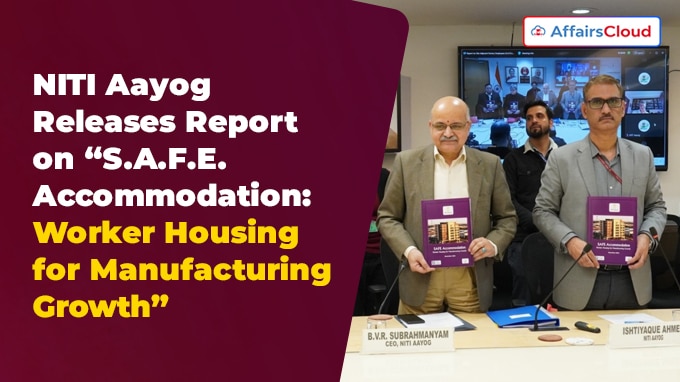 On December 19 2024, National Institution for Transforming India (NITI) Aayog chaired by Prime Minister (PM) Narendra Modi released a report titled “Site Adjacent Factory Employee(SAFE) Accommodation: Worker Housing for Manufacturing Growth.” The report highlights the importance of secure, affordable, flexible, and efficient housing solutions for industrial workers to support India’s manufacturing growth.
On December 19 2024, National Institution for Transforming India (NITI) Aayog chaired by Prime Minister (PM) Narendra Modi released a report titled “Site Adjacent Factory Employee(SAFE) Accommodation: Worker Housing for Manufacturing Growth.” The report highlights the importance of secure, affordable, flexible, and efficient housing solutions for industrial workers to support India’s manufacturing growth.
- The initiative was launched as part of the Union Budget 2024-25, with the aim of addressing worker accommodation challenges in industrial zones across India.
- It will be executed under a Public-Private Partnership (PPP) model, with Viability Gap Funding (VGF) support and contributions from anchor industries which will lead to enhanced productivity, lower attrition and increased investment in the manufacturing sector.
Note: VGF is a government grant of up to 40% of the total project cost, provided to support infrastructure projects that are economically justified but not financially viable.
Highlights of the Report:
Importance of Worker Housing:
i.Boosting Manufacturing Sector: The report emphasizes the need for well-planned housing near industrial hubs to ensure a stable workforce, vital for meeting India’s manufacturing targets.
ii.Economic Growth: Adequate housing directly impacts workforce productivity, reduces attrition rates and supports India’s vision of becoming a global manufacturing hub.
iii.Global Competitiveness: By improving worker welfare, India aligns with international labor standards, attracting global investments.
Key Challenges Identified:
i.Restrictive Zoning Laws: Housing near industrial zones is often restricted, leading to long commute times.
ii.Conservative Building Regulations: Low Floor Area Ratios (FAR) hinder high-capacity housing.
iii.Financial Barriers: High capital costs and low returns discourage private sector participation.
Proposed Solutions:
i.Regulatory Changes: Redefine worker housing as a residential category, streamline environmental clearances and promote gender inclusive policies.
- Residential property tax, electricity and water tariffs apply.
- Good and Services Tax (GST) exemptions for accommodations meeting specified criteria (e.g., Rs 20,000 per person per month for a continuous stay of 90 days).
- Amend zoning regulations to allow mixed-use developments near industrial hubs, facilitating worker housing close to workplaces.
- Include S.A.F.E. accommodations under the exemptions provided for industrial sheds, schools, colleges, and hostels in the draft notification issued by the Ministry of Environment, Forest, and Climate Change (MoEF&CC).
ii.Financial Support: Provide VGF to cover up to 30% – 40% of project costs and amend policies to include affordable rental housing under VGF eligibility.
- This includes 20% from the Department of Economic Affairs (DEA), Ministry of Finance (MoF) and 10% from the sponsoring nodal ministry, with additional contributions from state governments.
India’s Manufacturing Goal:
i.India is aiming to elevate its manufacturing sector’s contribution to Gross Domestic Product (GDP) from the current 17% to 25% as part of its long term vision of achieving ‘Viksit Bharat’ by 2047.
ii.According to the Economic Survey 2023-24, India needs to generate 7.85 million jobs annually until 2030 to sustain its economic growth trajectory.
iii.As the country progresses towards becoming a USD 5 trillion economy, addressing worker’s accommodation challenges is a priority.
About National Institution for Transforming India (NITI) Aayog:
Chairperson- PM Narendra Modi
Headquarters- New Delhi (Delhi)
Established- January 1, 2015




